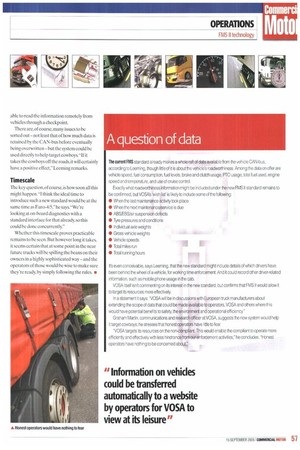A question of data
Page 59

If you've noticed an error in this article please click here to report it so we can fix it.
The current FMS standard already makes a whole raft of data available from the vehcle CAN-bus, according to Leeming, though little of it is about the vehicle's roadworthiness. Among the data on offer are vehicle speed, fuel consumption, fuel levels, brake and clutch usage, PTO usage, total fuel used, engine speed and temperature, and use of cruise control.
Exactly what roadworthiness information might be included under the new FMS II standard remains to be confirmed, but VOSA's 'wish list' is likely to include some of the following: • When the last maintenance activity took place • When the next maintenance/service is due • ABS/EBS/air suspension defects • Tyre pressures and conditions • Individual axle weights • Gross vehicle weights • Vehicle speeds • Total miles run • Total running hours It's even conceivable, says Leeming, that the new standard might include details of which drivers have been behind the wheel of a vehicle, for working time enforcement. And it could record other driver-related information, such as mobile phone usage in the cab.
VOSA itself isn't commenting on its interest in the new standard, but confirms that FMS II would allow it to target its resources more effectively.
In a statement it says: "VOSA will be in discussions with European truck manufacturers about extending the scope of data that could be made available to operators, VOSA and others where this would have potential benefits to safety, the environment and operatonal efficiency."
Graham Marin, communications and research officer at VOSA, suggests the new system would help t target cowboys; he stresses that honest operators have Idle to fear "VOSA targets its resources on the non-compliant. This would enable the compliant to operate more efficiently and effectively with less hindrance from our enforcement activities," he concludes. "Honest operators have nothing to be concerned about.',:






































































































































































































